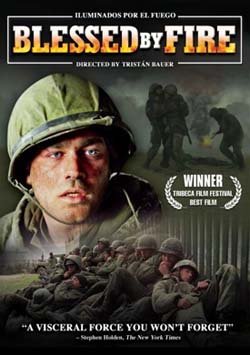

Reviews of Recent Independent, Foreign, & Documentary Films in Theaters and DVD/Home Video
Directed by: Tristán Bauer. Produced by: Carlos Ruta. Written by: Edgardo Esteban, Gustavo Romero Borri, Bauer & Miguel Bonasso. Director of Photography: Javier Juliá. Edited by: Alejandro Brodersohn. Music by: Federico Bonasso. Released by: Koch Lorber Films. Language: Spanish with English subtitles. Country of Origin: Argentina/Spain. 104 min. Not Rated. With: Gastón Pauls, Pablo Riva, César Albarracín, Hugo Carrizo, Virginia Innocenti, Juan Leyrado, Arturo Bonín & Jon Lucas. DVD Features: Trailer. Behind-the-scenes footage. How real this fictionalized account of two young Argentinean soldiers surviving the horrors of their country’s disastrous 1982 attempt to reclaim the Falkland Islands (known in Argentina as the Malvinas), I can’t say. This might be part of director/co-writer Tristán Bauer’s problem, or actually one of them. In many instances, his film is a stark, respectful, and even engrossing account, but yet another example of a not-quite fictional film that raises more questions than it attempts to answers. Perhaps a documentary would have been a better approach, dealing with the war’s survivors and providing more background on why Argentina’s military government decided to invade an isolated speck in the South Atlantic, especially for an international audience. (Bauer previously made documentaries on Evita Peron and Argentinean writer Julio Cortázar.) One of the best sections, shot and edited in a conventional documentary, opens the film – marching protestors demanding civil rights and better wages. In the present day, journalist Esteban (Gastón Pauls) receives a phone call from the wife of his former war comrade Alberto (Pablo Ribba), who has taken a lethal overdose of drugs and is now comatose. This apparent suicide attempt causes Esteban to look back on his time in the war with Vargas and fellow soldier Juan (César Albarracín), starving, freezing, and undersupplied on the battlefield, with a wretchedly one-note lieutenant barking at them. The screenwriters do, however, successfully show the camaraderie of the three soldiers, especially when, breaking the rules, they steal and kill a sheep for substance. The punishment for this violation begins Alberto’s psychological meltdown. (Hundreds of veterans have committed suicide since coming home.) Cutting back and forth from the present to the past, the film’s not as jarring or emotionally saturated as Flags of Our Fathers. I admired Saving Private Ryan as much as the next genre fan, but the influence from Spielberg’s quintessential work of stripping away war’s veneer has been hit or miss. Blessed by Fire falls into the latter category, despite the use of digital cameras in a visceral style. The familiarity of the washed-out and gray-tint cinematography, the shaky camerawork in the battle scenes (sometimes to the effect of not being able to see what is going on at all), and the disquietingly shadowy night scenes lose their energy quickly, and the script doesn’t lift the material above war movie conventions (with variations of “I won’t let you die here, buddy,” or “We’ve got to pull back, don’t go back.”) Bauer at one point obviously and directly refers to Private Ryan when Esteban, like Tom Hanks, goes into a momentary trance, staring off sort of still and dazed at the battle around him, everything in slow motion and silent.
DVD Extras: Koch Lorber has made this a miniscule offering, including only a theatrical trailer and a behind-the-scenes featurette that is
two-and-a-half minutes long, half of it simply clips from the battle scenes and the rest brief images (actually, only one) of Bauer directing a
scene.
Jack Gattanella
|